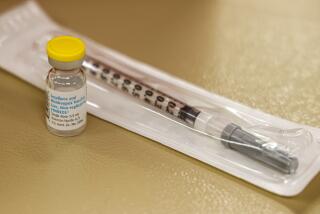HPV vaccine gets a (mostly) clean bill of health
- Share via
A large study of the safety of the HPV vaccine has turned up no unexpected side effects.
The study, published Monday in the journal Archives of Pediatrics & Adolescent Medicine, did find that the vaccine caused some women to faint the day they received it, and some recipients also developed skin infections. Both problems are believed to be general side effects of vaccines, and unrelated to anything specific about the HPV shot.
HPV, or human papillomavirus, is the most common sexually transmitted disease among American women. While infection generally causes little harm, severe cases can lead to cervical cancer in women and genital warts in both men and women. The HPV vaccine, sold under the brand-name Gardasil, was first approved in 2006, and is now approved for both men and women ages 9 to 26. The drug is produced by Merck & Co., who also sponsored the new study. (As with many new drugs, conducting the safety study was a condition of the Food and Drug Administration’s approval).
The study analyzed data from almost 190,000 women who received the vaccine at Kaiser Permanente hospitals. Of those, 44,000 women received the recommended “three-dose” vaccine. The researchers looked to see whether the time period after a vaccination dose included more health problems than a time period further away from the dose for either group.
The researchers, along with an independent safety review board, found that only two of the dozens of conditions considered were elevated after a dose: fainting and skin infections. Both conditions have been associated with vaccinations before, though the exact cause in this case is unknown. It is possible, the researchers wrote, that both were simply associated with the stress of getting a shot, and had nothing to do with the HPV vaccine.
While the study concluded that the vaccination is safe, the researchers only analyzed short time periods around injections. As a result, it remains unknown whether any long-term safety risks exist -- though public health officials have yet to note any serious red flags.
You can read a summary of the study here.
Return to the Booster Shots blog.






